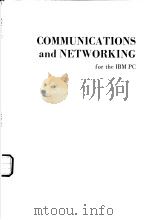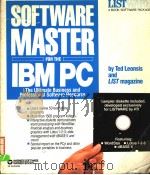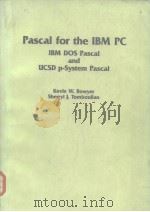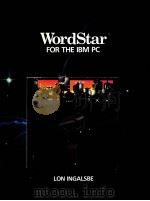《ASSEMBLY LANGUAGE FOR THE IBM-PC SECOND EDITION》
| 作者 | 编者 |
|---|---|
| 出版 | PRENTICE HALL |
| 参考页数 | 623 |
| 出版时间 | 1993(求助前请核对) 目录预览 |
| ISBN号 | 0023596511 — 求助条款 |
| PDF编号 | 812829288(仅供预览,未存储实际文件) |
| 求助格式 | 扫描PDF(若分多册发行,每次仅能受理1册) |
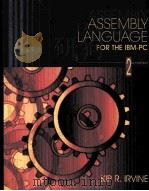
1 Introduction1
1.1 Introducing Assembly Language1
Assembly Language Applications3
Machine Language3
1.2 Data Representation4
Binary Numbers4
Converting Binary to Decimal7
Hexadecimal Numbers7
Signed Numbers8
Character Storage9
1.3 Assembly Language: An Introduction10
Assembly Language Instructions10
A Sample Program11
DEBUG Commands13
The PAGE.COM Program14
1.4 Basic Elements of Assembly Language15
Constant15
Statement17
Name18
1.5 Sample HELLO Program19
1.6 Review Questions20
2 Hardware and Software Architecture22
2.1 Components of a Microcomputer22
Video Display22
Keyboard23
Disk Drives23
System Unit23
Intel Microprocessor Family25
2.2 System Architecture26
Central Processing Unit (CPU)26
Registers28
Flags31
Stack32
Instruction Execution Cycle35
2.3 System Software and Memory35
Memory Architecture35
DOS Initialization36
Video Display37
Read-Only Memory (ROM)38
Address Calculation38
Memory Addressing Using Registers39
2.4 Review Questions39
2.5 Programming Exercises41
3 Assembly Language Fundamentals46
3.1 Data Definition Directives46
Define Byte (DB)47
Define Word (DW)49
Define Doubleword (DD)51
DUP Operator51
3.2 Data Transfer Instructions52
MOV Instruction52
Offsets53
XCHG Instruction55
Stack Operations55
3.3 Arithmetic Instructions56
INC and DEC Instructions57
ADD Instruction57
SUB Instruction58
Flags Affected by ADD and SUB58
3.4 Addressing Modes60
Register Operand61
Immediate Operand61
Direct Operand61
Indirect Operand62
Based and Indexed Operands63
Base-Indexed Operand64
Base-Indexed with Displacement64
Summing a List of Numbers65
3.5 Program Structure66
Memory Models67
3.6 Review Questions69
3.7 Programming Exercises73
4 The Macro Assembler76
4.1 The Assembly Process76
A Sample Program77
Assemble the Program78
Link and Run the Program79
4.2 Related Files80
Listing File80
Map File81
Batch Files82
4.3 Equates83
The Equal-Sign Directive83
EQU Directive84
4.4 Operators and Expressions85
Arithmetic Operators85
Boolean Operators86
OFFSET, PTR, and LABEL86
Operands with Displacements88
Other Assembler Operators89
4.5 Transfer-of-Control Instructions91
JMP Instruction91
LOOP Instruction93
4.6 Using the 80386 Processor95
4.7 Debugging Workshop96
Operand Sizes and Addressing Errors97
4.8 Review Questions98
4.9 Programming Exercises103
5 Input-Output Services106
5.1 Procedures107
PROC and ENDP Directives107
Sample Program: SUBS.ASM107
Near and Far Procedures108
5.2 Software Interrupts111
INT Instruction113
Device Names115
5.3 DOS Function Calls116
01h: Console Input With Echo117
02h: Character Output117
05h: Printer Output117
06h: Direct Console Input-Output118
07h: Direct Console Input119
08h: Console Input Without Echo119
09h: String Output119
OAh: Buffered Console Input119
OBh: Get Console Input Status121
OCh: Clear Input Buffer, Invoke Input Function121
BIOS-Level Keyboard Input (INT 16h)121
ASCII Control Characters123
5.4 BIOS-Level Video Control (INT 10h)123
Displays, Modes, and Attributes124
127h: Set Video Mode127
01h: Set Cursor Lines128
02h: Set Cursor Position129
03h: Get Cursor Position130
05h: Set Video Page130
06h, 07h: Scroll Window Up or Down131
08h: Read Character and Attribute132
09h: Write Character and Attribute133
0Ah: Write Character133
0Fh: Get Video Mode133
11h: Load Default ROM Fonts134
5.5 Review Questions134
5.6 Programming Exercises137
6 Conditional Processing141
6.1 Boolean and Comparison Instructions141
The Flags Register141
AND Instruction142
OR Instruction144
XOR Instruction145
NOT Instruction146
NEG Instruction146
TEST Instruction147
CMP Instruction147
6.2 Conditional Jumps148
Conditional Jump Instruction149
Applications Using Conditional Jumps151
6.3 Conditional Loops157
LOOPZ (LOOPE) Instruction157
LOOPNZ (LOOPNE) Instruction158
6.4 High-Level Logic Structures159
IF Statement160
WHILE Structure161
REPEAT ... UNTIL Structure163
CASE Structure164
Offset Table165
6.5 Review Questions166
6.6 Programming Exercises169
7 Arithmetic172
7.1 Shift and Rotate Instructions173
SHL Instruction173
SHR Instruction175
SAL and SAR Instructions176
ROL Instruction176
ROR Instruction177
RCL and RCR Instructions178
7.2 Sample Applications179
Shifting Multiple Bytes179
Multiplication and Division180
Display a Number in ASCII Binary181
Isolate a Bit String182
7.3 Multiple Addition and Subtraction183
ADC Instruction183
SBB Instruction185
7.4 Signed Arithmetic186
7.5 Multiplication and Division187
MUL and IMUL Instructions187
DIV and IDIV Instructions189
Divide Overflow190
7.6 ASCII Arithmetic191
AAA Instruction193
AAS Instruction195
AAM Instruction196
AAD Instruction197
7.7 Packed Decimal Arithmetic197
DAA Instruction198
DAS Instruction198
BCD Addition Example198
7.8 Review Questions201
7.9 Programming Exercises204
8 Numeric Conversions and Libraries208
8.1 Character Translation Using XLAT209
The XLAT Instruction209
Character Filtering210
Character Encoding210
8.2 Binary to ASCII Conversion213
The WRITEINT Procedure214
8.3 ASCII to Binary Conversion218
The READINT Procedure218
8.4 Separately Assembled Modules222
EXTRN Directive223
PUBLIC Directive224
Calling DISPLAYSTR from Another Module224
8.5 Creating External Subroutines226
Individual Subroutine Descriptions227
A Test Program236
More About the Linker237
8.6 Stack Parameters238
Recursion239
8.7 Review Questions242
8.8 Programmming Exercises244
9 String Processing251
9.1 String Storage Methods252
9.2 String Primitive Instructions253
MOVS (Move String)256
CMPS (Compare Strings)258
SCAS (Scan String)260
STOS (Store in String)262
LODS (Load String)263
9.3 A Library of String Routines263
READSTRING Procedure264
STRCHR Procedure265
STRCOMP Procedure266
STRCOPY Procedure267
STRDEL Procedure268
STRLEN Procedure269
STRSTR Procedure270
STRUPR Procedure271
WRITESTRING Procedure272
9.4 Creating a Link Library272
9.5 Application: String Library Demo Program275
9.6 Review Questions278
9.7 Programming Exercises280
10 Macros and Structures285
10.1 Introduction285
Declaring and Calling Macros287
Passing Parameters288
Nested Macros290
LOCAL Directive291
10.2 Special Techniques292
Macros Calling Procedures292
Conditional-Assembly Directives293
EXITM Directive295
10.3 Macro Operators297
10.4 A Macro Library299
10.5 Advanced MACRO Usage303
Defining Repeat Blocks303
Additional Tips307
10.6 Advanced Operators and Directives313
Type Operators313
STRUC Directive314
RECORD Directive316
10.7 Review Questions320
10.8 Programming Exercises323
11 Disk Storage327
11.1 Disk Storage Fundamentals328
Physical and Logical Chacteristics328
Types of Disks329
Disk Formats330
Disk Directory331
Directory Format332
Sample Disk Directory334
File Allocation Table (FAT)335
Reading and Writing Disk Sectors336
11.2 Application: Sector Display Program337
11.3 Application: Cluster Display Program340
11.4 System-Level File Functions345
DOS Error Codes345
Displaying DOS Error Messages346
DOS Error Me sage Handler347
File Specifications350
11.5 Reading the DOS Command Tail350
11.6 Drive and Directory Manipulation352
Set Default Disk Drive (0Eh)353
Get Default Disk Drive (19h)353
Get Disk Free Space (36h)353
Get Current Directory Path (47h)354
Set Current Directory (3Bh)354
Create Subdirectory (39h)355
Remove Subdirectory (3Ah)355
Get Device Parameters (44h)355
11.7 File Manipulation357
Get/Set File Attribute (43h)357
1993《ASSEMBLY LANGUAGE FOR THE IBM-PC SECOND EDITION》由于是年代较久的资料都绝版了,几乎不可能购买到实物。如果大家为了学习确实需要,可向博主求助其电子版PDF文件(由 1993 PRENTICE HALL 出版的版本) 。对合法合规的求助,我会当即受理并将下载地址发送给你。
高度相关资料
-
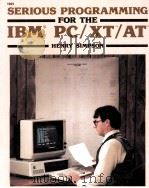
- Serious Programming for the IBM PC/XT/AT
- 1985 TAB BOOKS Inc
-

- Excel macros for the IBM PC
- 1990 Windcrest Books
-
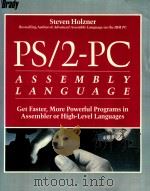
- PS/2-PC ASSEMBLY LANGUAGE
- 1989 BRADY NEW YORK
-
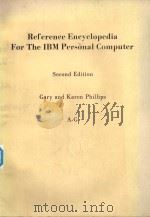
- REFERENCE ENCYCLOPEDIA FOR THE IBM PERSONAL COMPUTER SECOND EDITION
- 1983 ASHTON TATE
-
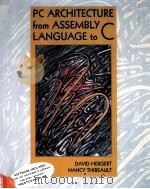
- PC ARCHITECTURE FROM ASSEMBLY LANGUAGE TO C
- 1998 PRENTICE HALL
-
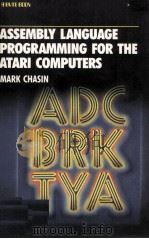
- Assembly Language Programming For The Atari Computers
- 1984 McGraw-Hill Book Company
-
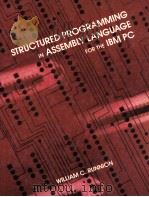
- Structured Programming in Assembly Language For The IBM PC
- 1988 PWS-KENT Publishing Company
-
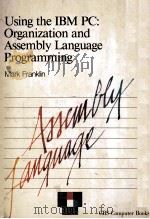
- Using the IBM Personal Computer:Organization and Assembly Language Programming
- 1984 CBS College Publishing
-
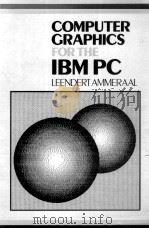
- COMPUTER GRAPHICS FOR THE IBM PC
- 1987 JOHN WILEY & SONS
-
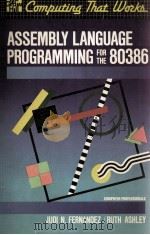
- ASSEMBLY LANGUAGE PROGRAMMING FOR THE 80386
- 1990 MCGRAW-HILL PUBLISHING COMPANY
提示:百度云已更名为百度网盘(百度盘),天翼云盘、微盘下载地址……暂未提供。➥ PDF文字可复制化或转WORD

